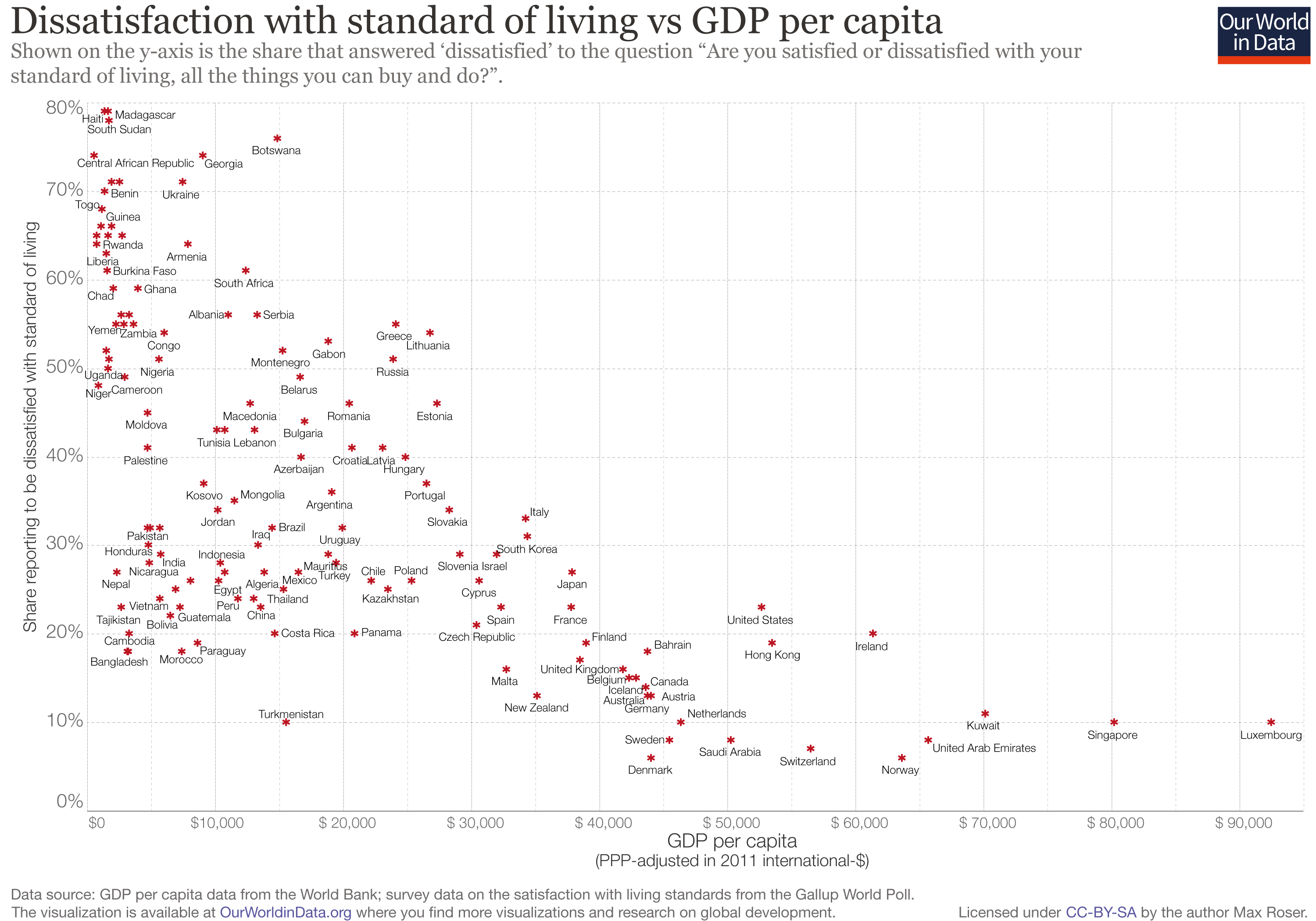Ethics and Science Quarantine Zone
-
Inequality creates poverty you numpty. Poverty creates suffering.
42 people hold same wealth as 3.7bn poorest
If you can't see, just from the headline, why inequality might cause problems, then you're a lost cause. -
I've tried not to wade in or pile on but do you read anything anybody else takes time to post? Sometimes it's not a conspiracy, you're just wrong.
-
trippy wrote:Inequality creates poverty you numpty. Poverty creates suffering. 42 people hold same wealth as 3.7bn poorest If you can't see, just from the headline, why inequality might cause problems, then you're a lost cause.
No, it doesn't.
Why would it?Gamgertag: JRPC
PSN: Lastability95 -
Ahaha, you really are a cretin aren't you Jrpc?
Well trolled...Steam: Ruffnekk
Windows Live: mr of unlocking
Fightcade2: mrofunlocking -
The confusion of inequality with poverty comes straight out of the lump fallacy—the mindset in which wealth is a finite resource, like an antelope carcass, which has to be divvied up in zero-sum fashion, so that if some people end up with more, others must have less. As we just saw, wealth is not like that: since the Industrial Revolution, it has expanded exponentially. That means that when the rich get richer, the poor can get richer, too. Even experts repeat the lump fallacy, presumably out of rhetorical zeal rather than conceptual confusion. Thomas Piketty, whose 2014 bestseller Capital in the Twenty-First Century became a talisman in the uproar over inequality, wrote, “The poorer half of the population are as poor today as they were in the past, with barely 5 percent of total wealth in 2010, just as in 1910.” But total wealth today is vastly greater than it was in 1910, so if the poorer half own the same proportion, they are far richer, not “as poor.”Gamgertag: JRPC
PSN: Lastability95 -
Show networks
- OOH_HOLD_DAT
- Xbox
- MM Jeremy Wade
- PSN
- SUPERJEDININJA
- Steam
- Roujin5555
Send messageEconomic inequality allows the side with the most economic influence to lobby governments in their favour.
The people/corporate entitirs with the most economic influence have very different desires to those woth the least.
Man is out here looking like Skepta trying to deny he's a crackhead rn."Let me tell you, when yung Rouj had his Senna and Mansell Scalextric, Frank was the goddamn Professor X of F1." -
JRPC wrote:
No, it doesn't. Why would it?trippy wrote:Inequality creates poverty you numpty. Poverty creates suffering. 42 people hold same wealth as 3.7bn poorest If you can't see, just from the headline, why inequality might cause problems, then you're a lost cause.
Entertain me. Why wouldn't it?
Why didn't slavery cause poverty? Why didn't colonialism cause poverty? Why does capitalism not create poverty?
To me it's kind of obvious, but I could be wrong. Maybe everyone in the world is better off with a financial system that's a giant pyramid scheme giving a select few more money than they could ever need while untold millions fight for survival every day. -
JRPC wrote:
Muzzy, no I'm not ignoring anything. I've addressed Stoph's post. I don't think any of those examples speak to any intrinsic harm of inequality. Not nearly.
I don't understand how anyone could think they do.
We're talking about economic inequality here right?
]
Oh God, are you going to do that thing again where everything except what you want is outside of the scope? Economic inequality isn't a discreet category that means you can ignore social issues.
Jesus.
I'm still great and you still love it. -
You must be very well off and extremely lacking in empathy not to see or understand the difficulties other people face, every day.
-
JRPC wrote:The confusion of inequality with poverty comes straight out of the lump fallacy—the mindset in which wealth is a finite resource, like an antelope carcass, which has to be divvied up in zero-sum fashion, so that if some people end up with more, others must have less. As we just saw, wealth is not like that: since the Industrial Revolution, it has expanded exponentially. That means that when the rich get richer, the poor can get richer, too. Even experts repeat the lump fallacy, presumably out of rhetorical zeal rather than conceptual confusion. Thomas Piketty, whose 2014 bestseller Capital in the Twenty-First Century became a talisman in the uproar over inequality, wrote, “The poorer half of the population are as poor today as they were in the past, with barely 5 percent of total wealth in 2010, just as in 1910.” But total wealth today is vastly greater than it was in 1910, so if the poorer half own the same proportion, they are far richer, not “as poor.”
Well, credit where it's due, this is a useful quote to work with.
I'm still great and you still love it. -
JRPC wrote:Can you explain why inequality is an evil in itself?
Did that.
JRPC wrote:I'm trying to get to a more foundational starting point. Is inequality intrinsically harmful? If so, how? I don't think any of what Stoph has posted really speaks to that, and not to disparage, but most there strike me as pure tautology. Actually reading through those, the only one that actually does seem to follow directly is the one about access to certain medical treatments.Stopharage wrote:Inequality leads to improved life chances for those at the top. As a result networking and nepotism exist at the expense of a working meritocracy and fairness. Those at the top can manipulate market conditions to further grow the gap between themselves and the rest.
My very first point clearly addresses your question. The rest do as well. I also noted your usual disingenuous and disparaging reply after someone had spent time to address your question. Namely:-JRPC wrote:That's something to go on at least.
Then, latterly.JRPC wrote:Muzzy, no I'm not ignoring anything. I've addressed Stoph's post. I don't think any of those examples speak to any intrinsic harm of inequality. Not nearly.
You're right, all those by-products of inequality make life hunky dory for those who suffer from them.
JRPC wrote:I don't understand how anyone could think they do.
We're talking about economic inequality here right?.
We were talking about inequality. You can't suddenly frame the debate after it's begun. Regardless of this, how life chances, access to healthcare, pay gaps, racial preference etc etc. aren't to do with economic inequality is beyond me.
Your problem is that you have everything invested in a number of thinkers, but don't critique them or think for yourself; your musings are superficial and shaped by those you lap up. -
Sees pile of dogs. Pauses for thought. Dives on top.
JRPC wrote:acemuzzy wrote:* is inequality inherently bad? * Lots of examples of it being inherently bad * I want a more foundational look at whether it's inherently bad; why are people not engaging with the debate? Ignoring the content of others post while expecting complete asymmetry in his they handle yours, is oddly narcissistic
Muzzy, no I'm not ignoring anything. I've addressed Stoph's post. I don't think any of those examples speak to any intrinsic harm of inequality. Not nearly.
I don't understand how anyone could think they do.
We're talking about economic inequality here right?
OK this should be helpful. It's an excerpt from the the chapter on inequality from EN. So there we go.
http://bigthink.com/big-think-books/steven-pinker-enlightenment-now-inequality-happiness
This opening paragraph is a weak start.
But actually he’s not saying anything too silly once he balances it all out.The starting point for understanding inequality in the context of human progress is to recognize that income inequality is not a fundamental component of well-being. It is not like health, prosperity, knowledge, safety, peace, and the other areas of progress I examine in these chapters. The reason is captured in an old joke from the Soviet Union. Igor and Boris are dirt-poor peasants, barely scratching enough crops from their small plots of land to feed their families. The only difference between them is that Boris owns a scrawny goat. One day a fairy appears to Igor and grants him a wish. Igor says, “I wish that Boris’s goat should die.”
The point of the joke, of course, is that the two peasants have become more equal but that neither is better off, aside from Igor’s indulging his spiteful envy.But in their recent article “Why People Prefer Unequal Societies,” the psychologists Christina Starmans, Mark Sheskin, and Paul Bloom took another look at the studies and found that people prefer unequal distributions, both among fellow participants in the lab and among citizens in their country, as long as they sense that the allocation is fair: that the bonuses go to harder workers, more generous helpers, or even the lucky winners of an impartial lottery.Either way, I suspect that it’s less effective to aim at the Gini index as a deeply buried root cause of many social ills than to zero in on solutions to each problem: investment in research and infrastructure to escape economic stagnation, regulation of the finance sector to reduce instability, broader access to education and job training to facilitate economic mobility, electoral transparency and finance reform to eliminate illicit influence, and so on. The influence of money on politics is particularly pernicious because it can distort every government policy, but it’s not the same issue as income inequality. After all, in the absence of electoral reform the richest donors can get the ear of politicians whether they earn 2 percent of national income or 8 percent of it.
This is just an old left v right argument to some extent. Are people happier because they’re incentivised to produce stuff through reward, which makes everyone happier? Would we be better if people were freer to produce what they want? How does want and need vs incentive factor in? You’ll have this argument forever. It usually comes down to how people want to live their own lives, the things they value. Most people can be happy with a balance probably.
When people talk about inequality and rising inequality, it’s not that they’re mixing it up with unfairness. It’s an increasing lack of balance between those two tensions. All of those things he lists as the real problems are made worse by high inequality and they’re harder to solve too. It may lead to the same outcome if a rich donor earning 2% of national income can corrupt a politician as easily as an 8%er. But that person can buy more politicians, buy more corporate mouth pieces to promote their agenda. They will have more influence on taxation, which means more children are less educated than they could be, than they would be if voters themselves were deciding how much to spend on educating their own children.
So, fair enough, he distinguishes a philosophical point on the optimum way to run societies from the ills that can emerge from disfunctional politics (which is worth lefties taking a bit of time to think about). But he seems to dismiss any link at all, which is silly. -
Luv 2 capture regulations.
-
It's thinly disguised "politics of envy" misdirection, this chat. Once again, whose interests are served by this line of thinking? "You've never had it so good" is a comment on absolute wealth. (And even then it can be challenged... Accomodation, child care etc, all have measurably suffered). Inequality is necessarily relative. Even Jordan Peterson acknowledges that inequality is a major problem because humans, like chimps, react very badly to it. A chimp who'll gladly munch on a cucumber will reject it after a while if he sees grapes fed to a neighbouring chimp. Even if the argument is right, therefore, that you are better off with a cucumber (viewed objectively, or from the point of view of a Martian), a real scholar will factor in the damage done to societal structures of growing inequality, income, capital, the lot. Idiots say it's out of scope and talk about something relevant only to a Martian.
Ps- the martians don't exist. -
I agree with monkey.
All societies rely on this intricate socio-economic balance between the rich and middle class/poor.
It doesn't matter whether the society is a liberal democracy, communism or a conservative dictatorship;
once this balance (perception?) of fair inequality is lost people will start to revolt against the ruling class given half the chance. I earlier cited the examples of fallen monarchies like the Romans, the Chinese, the French and the Russians. In those examples the ruling class took it a notch too far with dire consequences. Heads had to roll before things could change.
The big question is are the democracies we know now bound to spiral out of equlibrium?
As in the case of Trump and Brexit it's obvious the rich can buy more political influence than any other group. Effectively, the system is rigged in their favor as it creates a positive feedbackloop. This is evident even or especially on a geopolitical level. Perhaps it's only a matter of time before a so called democracy like the US (or UK) becomes a Russian like oligarchy/kleptocracy?
Human nature and all that.Steam: Ruffnekk
Windows Live: mr of unlocking
Fightcade2: mrofunlocking -
Great. That's the end of the discussion then.JRPC wrote:
Muzzy, no I'm not ignoring anything. I've addressed Stoph's post. I don't think any of those examples speak to any intrinsic harm of inequality. Not nearly.acemuzzy wrote:* is inequality inherently bad? * Lots of examples of it being inherently bad * I want a more foundational look at whether it's inherently bad; why are people not engaging with the debate? Ignoring the content of others post while expecting complete asymmetry in his they handle yours, is oddly narcissistic
What's next? -
So we've dropped the 'scientific' part of this discussion now?
What a fucking surprise...
Back to the inequality / Griff thread, perhaps?"I didn't get it. BUUUUUUUUUUUT, you fucking do your thing." - Roujin
Ninty Code: SW-7904-0771-0996 -
dynamiteReady wrote:So we've dropped the 'scientific' part of this discussion now?
What a fucking surprise...
Back to the inequality / Griff thread, perhaps?
Lol. Nah, let's start a sub thread of this, and then go off on a tangent again. *inception gif*
I'm still great and you still love it. -
There's definitely medical science up in here - demonstration of savage burns.
-
Remember guys, inequality isn't bad because some poor people are really happy and really while they and their families might die a lot sooner isn't happiness really what it's all about innit amirite?

Hold on lemme try again:

Shit no, I've done it wrong, those show the OTHER thing.
Damnit. -
It's okay, as long as you can keep the poor people happy there's nothing wrong whatsoever.
Give them a travel ban, build a wall, give them their blue passports, bomb a foreign country.
Meanwhile, bring on those lovely tax cuts tyvm.
Voter satisfaction matters.
By the way, it's all genetic, I'm entitled to my riches.
My skin tone is proof of that.Steam: Ruffnekk
Windows Live: mr of unlocking
Fightcade2: mrofunlocking -
So if you remember back to a bit earlier, Pinker points out that inequality frequently gets conflated with poverty and unfairness.
What you're doing there chump with your impressive graphs is the former. GDP is not a measure of inequality, it's a measure of the wealth of a country overall.
GDP, as your graphs point out, correlates strongly with measures of happiness, as Pinker himself points out in the excerpt from earlier.
Most damagingly, the sociologists Jonathan Kelley and Mariah Evans have snipped the causal link joining inequality to happiness in a study of two hundred thousand people in sixty-eight societies over three decades. Kelley and Evans held constant the major factors that are known to affect happiness, including GDP per capita, age, sex, education, marital status, and religious attendance, and found that the theory that inequality causes unhappiness “comes to shipwreck on the rock of the facts.” In developing countries, inequality is not dispiriting but heartening: people in the more unequal societies are happier. The authors suggest that whatever envy, status anxiety, or relative deprivation people may feel in poor, unequal countries is swamped by hope. Inequality is seen as a harbinger of opportunity, a sign that education and other routes to upward mobility might pay off for them and their children.Gamgertag: JRPC
PSN: Lastability95 -
When is there high inequality and no poor people?
-
Show networks
- OOH_HOLD_DAT
- Xbox
- MM Jeremy Wade
- PSN
- SUPERJEDININJA
- Steam
- Roujin5555
Send messageWhat happens if the people all work hard cos of the aspiration and happiness brought on by the economic inequality and then the inequality goes away?
Oh no wait, that will never happen because the people with the most economic influence will continually ensure the inequality is maintained because they are cunts or corporate entities that only care about making money."Let me tell you, when yung Rouj had his Senna and Mansell Scalextric, Frank was the goddamn Professor X of F1." -
I guess you could compare the rich and the fucking mega rich??
-
Show networks
- OOH_HOLD_DAT
- Xbox
- MM Jeremy Wade
- PSN
- SUPERJEDININJA
- Steam
- Roujin5555
Send messageWait, with no one to aspire to, why aren't the mega rich all depressed and unhappy and really lazy?"Let me tell you, when yung Rouj had his Senna and Mansell Scalextric, Frank was the goddamn Professor X of F1." -
https://i.imgur.com/F1oDgZG.png
Even the synopsis of the report is far more nuanced than anything you've said yourself. -
But hey, obviously, theres no link between inequality and poverty...
https://www.odi.org/sites/odi.org.uk/files/odi-assets/publications-opinion-files/3876.pdf
http://www.lse.ac.uk/Events/2017/02/20170208t1830vHKT/The-Relationship-between-Inequality-and-Poverty
... well, apart from the obvious one where inequality is literally the definition of the haves having and the have nots not-having.
"Guys, guys! A rising tide raises all boats! It'll all trickle down eventually!"
Howdy, Stranger!
It looks like you're new here. If you want to get involved, click one of these buttons!
Categories
- All Discussions2,715
- Games1,879
- Off topic836











